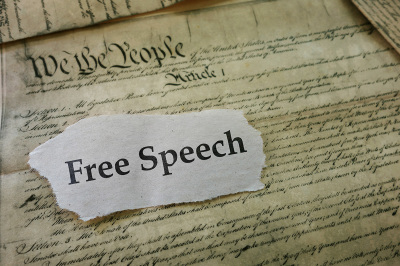
While some pastors shy away from addressing political or cultural issues for fear of offending people, others are crippled by fear of the so-called “Johnson Amendment” that was added to the Internal Revenue Code in 1954. But the Johnson Amendment is overblown and unconstitutional and must be repealed.
It’s time to end the chilling effect this amendment to the tax code has wielded over pastors, pulpits, and other nonprofit organizations. And it’s time to stop the Internal Revenue Service (IRS) from muzzling pastors and churches.
Rep. Mark Harris (R-N.C.) and Sen. James Lankford (R-Okla.) introduced the “Free Speech Fairness Act” in the U.S. House and Senate to amend the Internal Revenue Code to protect free speech. Though similar bills have been introduced in years past, the stage is set for this Congress to make repealing the Johnson Amendment a reality.
I have been a longtime advocate for repealing the Johnson Amendment, and in 2011, I served on a congressional task force at the request of Sen. Chuck Grassley (R-Iowa) to evaluate this amendment that has been used to chill free speech. Our legal panel recommended repealing the Johnson Amendment, and it’s time to finally follow through by ending this freedom-suppressing provision in the tax code.
A brief history
To understand why the Johnson Amendment has silenced pastors for so long, it’s important to understand its history.
In 1954, then-Senator Lyndon Baines Johnson amended the Internal Revenue Code through the Johnson Amendment to prohibit nonprofit organizations, including churches, from endorsing or opposing political candidates. This move that wreaked havoc on our first freedoms was largely in retaliation to a nonprofit group that campaigned against Johnson in his race for U.S. Senate.
Seventy-one years later, the Johnson Amendment still has a grip on pastors and nonprofit leaders who fear losing their tax-exempt status. Though this is certainly not an excuse to stay silent, it has been effective in silencing people who bought into this myth that they can lose their church’s tax-exempt status by wading into political waters from the pulpit.
The fear remains as long as the Johnson Amendment remains.
A muzzle for pastors to the detriment of society
Whether they are using the Johnson Amendment as an excuse to stay silent on political matters or they truly feel like the IRS has robbed them of their First Amendment freedoms, the Johnson Amendment has chilled freedom of speech for more than seven decades.
Culture is downstream from the Church. Is there any wonder why an anti-God ideology and the evils of abortion, transgenderism, and the LGBT agenda have permeated every corner of our institutions after generations of silence from the pulpit? This is the tragic result of pastors who refused to address these biblical issues to equip and educate their congregations.
Pastors should have the autonomy to speak truth from their pulpits and share their convictions without the looming presence of federal oversight. Throughout our nation’s history, parishioners gathered to hear the Word of God and were sent into the public square to make a positive impact on the culture through political engagement.
At its core, this attempt to silence pastors is unconstitutional and antithetical to our founding values. In a sense, it tells pastors to stay silent as Rome burns.
With a Republican trifecta in Washington, D.C., now is the time to protect pastors from the infringement of the federal government.
Returning Freedom to its rightful place
In 2017, President Trump pressured Congress to repeal the Johnson Amendment, but the language in the tax reform bill to do this was blocked by the Senate parliamentarian. The president also pledged to “totally destroy” the Johnson Amendment and “allow our representatives of faith to speak freely and without fear of retribution.”
He even signed an executive order in May 2017 that protected religious leaders who speak out politically. Though this didn’t dismantle the Johnson Amendment (only an act of Congress or a decision from the Supreme Court could do that), it did take necessary steps to enshrine freedom of speech for faith leaders.
Should the president sign a similar executive order in his second term? Absolutely. But what will secure protections for generations to come is Congress repealing the Johnson Amendment altogether.
As my friend, the late Dr. Jerry Falwell, used to say: “The idea that religion and politics don’t mix was invented by the devil to keep Christians from running their own country.”
The Rev. Charles G. Finney, revivalist in the Second and Third Great Awakenings, hit the nail on the head: “The time has come that Christians must vote for honest men and take consistent ground in politics, or the Lord will curse them … Christians have been exceedingly guilty in this matter. But the time has come when they must act differently. …[God] will bless or curse this nation, according to the course they take.”
If more Christians, and especially pastors, had this understanding of a Christian’s role in civic engagement, we would live in an entirely different country. As I often encourage pastors, now is the time to turn your muzzle into a megaphone.
Free exercise of religion and freedom of speech are paramount to our constitutional republic. The Johnson Amendment infringes on both of these rights, and it should be repealed entirely.
It’s past time we restore freedom in the pulpit, and the Free Speech Fairness Act will help return these first freedoms to their rightful place.
Mat Staver is founder and chairman of Liberty Counsel, chairman of Liberty Counsel Action, Faith and Liberty, Covenant Journey and Covenant Journey Academy. He has more than 350 legal opinions, authored eight scholarly law review publications, and many articles and books.
Mat has argued in many federal and state courts, including three landmark cases before the U.S. Supreme Court, which includes a 9-0 precedent-setting victory in Shurtleff v. City of Boston. This case unanimously rejected the 1971 Supreme Court opinion of Lemon v. Kurtzman that did incredible damage to the First Amendment for 51-years.
Mat hosts two daily radio programs, “Freedom’s Call and Faith and Freedom,” as well as a weekly television program, “Freedom Alive.”


















